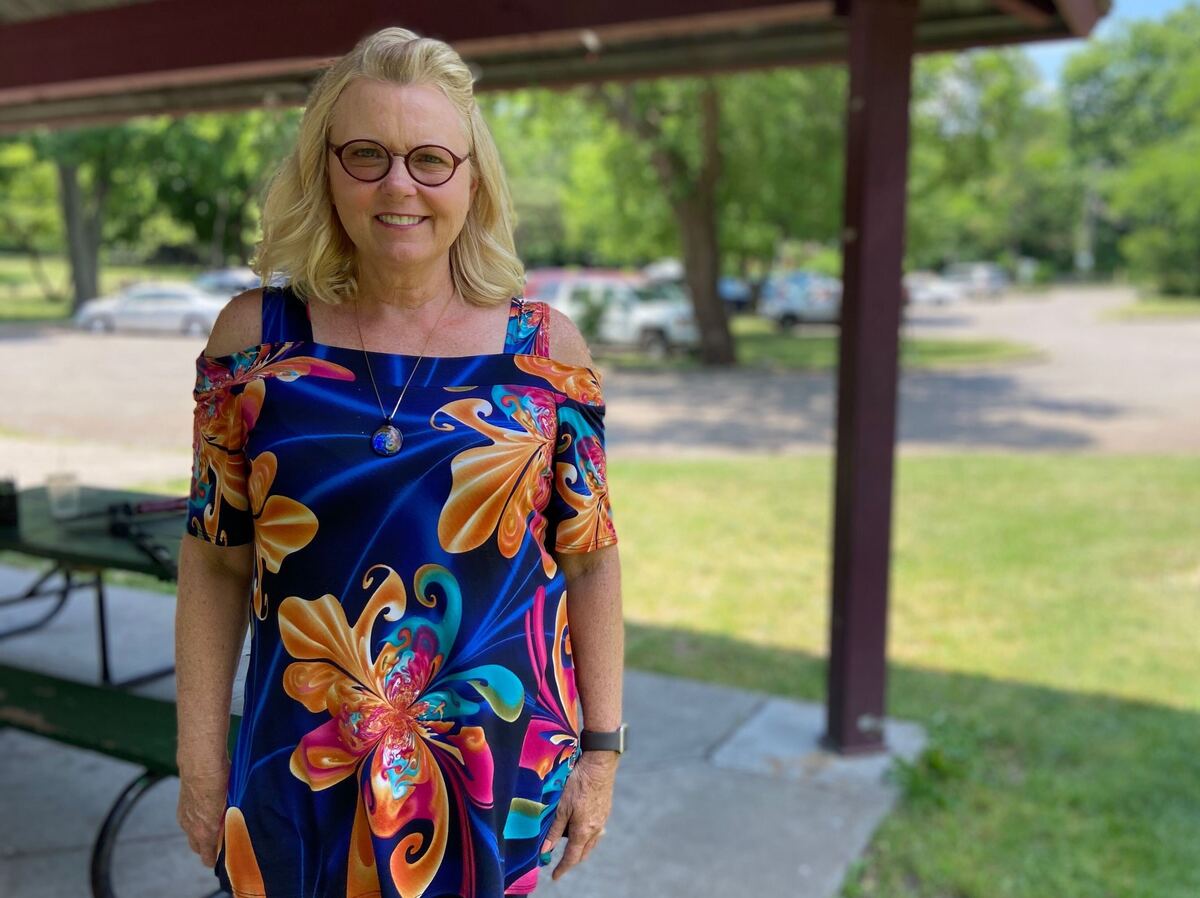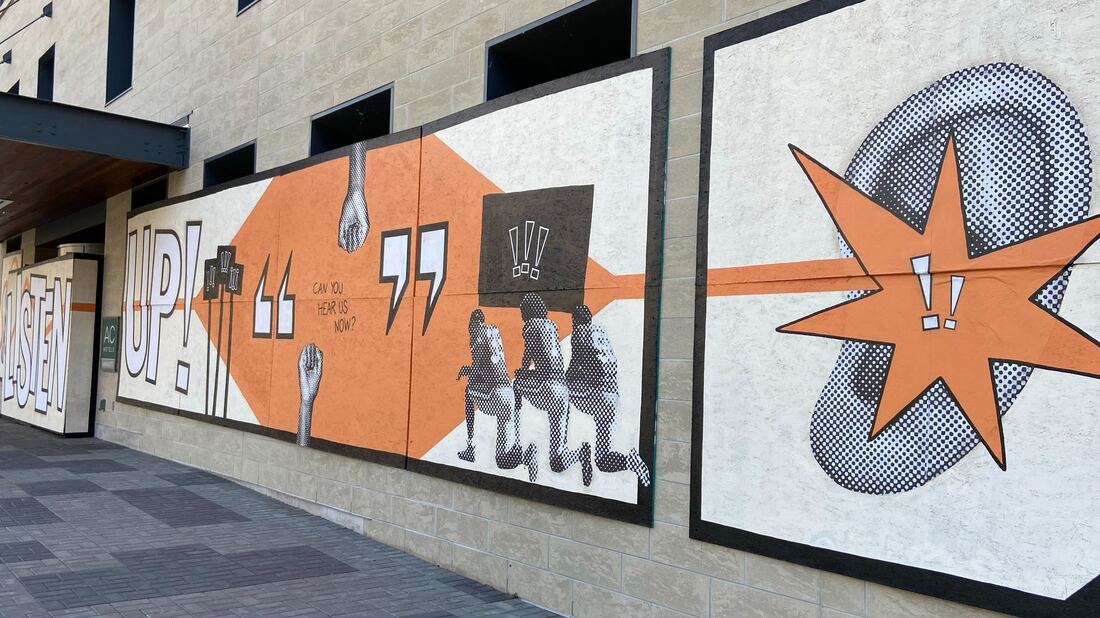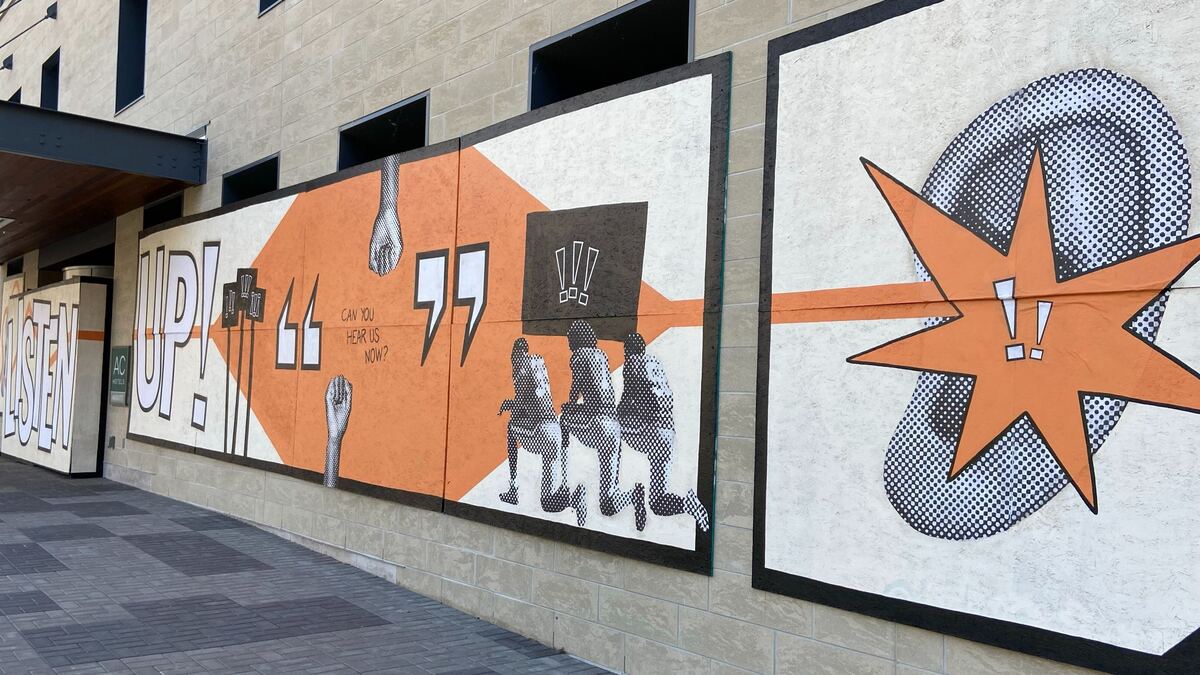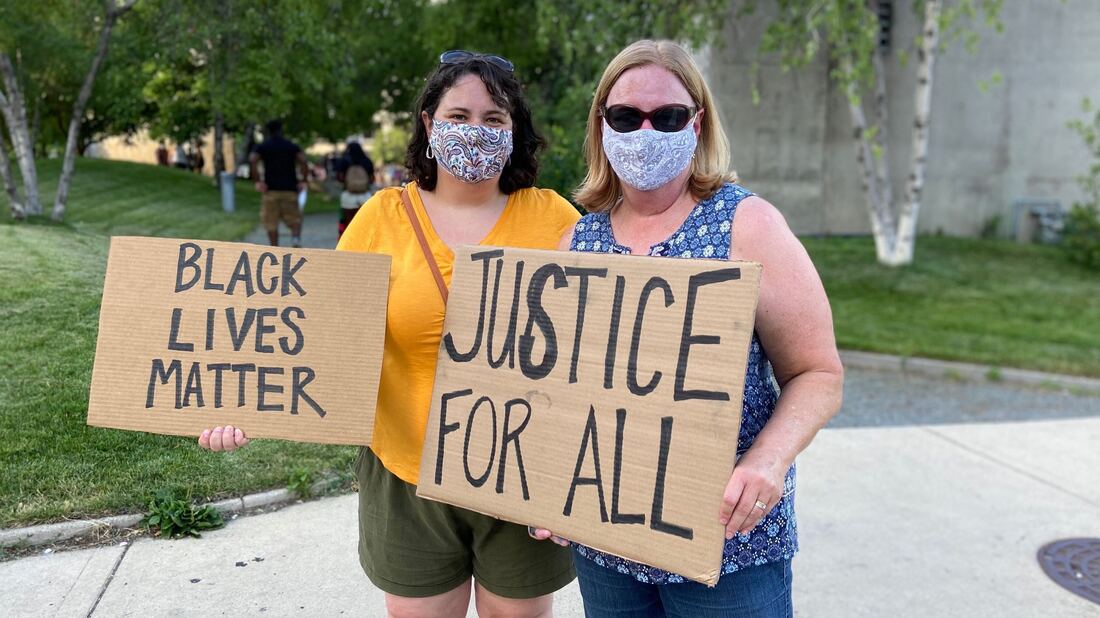
[ad_1]

Kim Gates says she never considered herself political until Donald Trump’s victory in 2016.
Asma Khalid/NPR
hide caption
toggle caption
Asma Khalid/NPR

Kim Gates says she never considered herself political until Donald Trump’s victory in 2016.
Asma Khalid/NPR
On a recent morning, Kim Gates helped hand out free boxes of fresh fruits and vegetables in an underserved area of Grand Rapids, Mich.
Lately, the retired school teacher from the nearby tiny town of Caledonia has been trying to volunteer with minority communities and read more about racism.
The 63-year-old white woman had always voted for the candidate she thought was best for the job — like, for instance, Michigan’s recent Republican governor, Rick Snyder. She says she never considered herself political until Donald Trump’s victory in 2016.
“The night he got elected I got online and started looking for issues I was going to support,” Gates said. “And I chose to support areas against racism and with immigration.”
Gates says she was drawn to those topics, in part, because she was living in a “very very white, very homogeneous community.” The election of Trump was her initial catalyst but, like many white voters, the death of George Floyd and the outcry that followed have made her more conscious of race and racial injustice.
Polling shows Gates is not alone. A recent Monmouth survey found 76% of Americans say racial and ethnic discrimination is a big problem in the country. That’s up from 51% five years ago. More than half of Americans also now support the Black Lives Matter movement, another poll found. In particular, white suburban voters are having a reckoning with race — showing up to protests in small towns and calling for police reform in communities that had never witnessed a Black Lives Matter rally before.
As NPR has previously reported, polls show an increasing number of white liberals began adopting more progressive positions on a range of cultural issues around 2012. These days, white Democrats — and, in particular, white liberals — are more likely than in decades past to support more liberal immigration policies, embrace racial diversity, and uphold affirmative action.
“This country needs a man like Gerald Ford”

Former President Gerald Ford’s boyhood home is seen in Grand Rapids, Mich.
Asma Khalid/NPR
hide caption
toggle caption
Asma Khalid/NPR

Former President Gerald Ford’s boyhood home is seen in Grand Rapids, Mich.
Asma Khalid/NPR
For decades, Kent County, home to Grand Rapids, has been reliably Republican. With the exception of Barack Obama’s narrow victory in 2008, no Democratic presidential candidate has carried the county since Lyndon B. Johnson in 1964.
But in 2016, Trump narrowly won it, by 3 percentage points — far narrower than Mitt Romney’s victory there four years prior.
And in 2018, Democrats further chipped away at that historical legacy. The state’s Democratic governor, Gretchen Whitmer, won the county by 4 percentage points. And then last year, conservative Rep. Justin Amash, who represents part of the county in Congress, left the Republican Party to become an independent.
Dutch Christian immigrants shaped the culture of the region. But these days, the suburbs are growing quickly and diversifying. The city of Kentwood, southeast of Grand Rapids, is known as the most diverse school district in Michigan.
The county prides itself on its unique vein of moderate Midwestern politics. Both Republicans and Democrats like to point out that Gerald Ford, the president who led the country in the wake of the Watergate scandal, hailed from Grand Rapids.
“This country needs a man like Gerald Ford,” said Tim England, who now lives in Ford’s boyhood home. “His philosophy was that he wanted to heal this country.”
England grew up as a Republican, but he says there’s no way he would vote for Trump.
“It’s a disgrace what he’s done to our democracy,” he said.
England wants a president who will be a steady hand and shepherd the country out of chaos, much like Ford after Richard Nixon. And this fall he intends to vote for presumptive Democratic nominee Joe Biden.
Dave Levitt said he’s now a “fallen conservative, a former conservative.”
Levitt voted for Romney in 2012, but then chose Hillary Clinton over Trump in 2016. He works in real estate and says for years he chose Republican presidents because of economic policy. He largely ignored the social issues, but he says he can’t anymore.
“I can’t see good people on both sides in Charlottesville, I’m sorry, I can’t,” Levitt said, referencing Trump’s comments on the 2017 incident. “If you’re marching down the street with a tiki torch saying, ‘Jews will not replace us,’ I’m not going to support that.”
And so come this fall, he too intends to vote for Biden, even though he feels like a man without a home in either political party.
“I think I didn’t understand white privilege”

Murals in Grand Rapids, Mich.
Asma Khalid/NPR
hide caption
toggle caption
Asma Khalid/NPR

Murals in Grand Rapids, Mich.
Asma Khalid/NPR
Kent County is the kind of place Biden may need if he intends to win back Michigan for Democrats — full of suburbanites and young, college-educated transplants who lean toward his party.
“When I went to college here in 2000, all of my friends left. It was pretty much just me and my husband here,” said Rachel Westerhof, a local Democratic organizer. “And now a number of those people have come back.”
But it’s not just young people who’ve moved into the county, which has been growing at a faster rate than the state.
Westerhof’s own parents moved to the region from Iowa two years ago. Her mother, Mary Meuzelaar, is a former Republican who began voting for Democrats in 2008 with Obama, and now considers herself a “fiery Democrat.” She says her change came down to values around poverty, equality and justice.
But more recently, that’s also incorporated race.
“I think I didn’t understand white privilege. I just didn’t understand it, because it wasn’t in the way I was brought up,” Meuzelaar said. She says she started to understand this privilege over the last eight years, and then Floyd was killed.
“Oh my goodness, I was just devastated, and suddenly it just hit home in a way that I had never felt,” she said. “I’m so embarrassed ’cause I didn’t see it before. I want so badly to make up for the things we’ve done for the last 150 years and I feel helpless at times.”
But voting makes her feel slightly less helpless. And the way the president has handled this situation, she says, makes it easy to vote against him.
At a Juneteenth celebration Friday evening, white residents lined the street demanding change, asking passing cars to honk in support. A young white man in an Eddie Bauer backpack held up a sign that read “Black Lives Matter! Period!” Another man held a sign with the words “Abolish White Supremacy.”
Some people, like Susie Hall, a 62-year-old teacher, had never attended a Juneteenth celebration before. But the racial unrest in the country prompted her to come out with her daughter.

Susie Hall, right, and her daughter Rebekah are seen at a Juneteenth celebration.
Asma Khalid/NPR
hide caption
toggle caption
Asma Khalid/NPR

Susie Hall, right, and her daughter Rebekah are seen at a Juneteenth celebration.
Asma Khalid/NPR
“The last couple of years I realize I taught my kids to be colorblind,” she said. “But I’m realizing, I guess, and in the process of educating myself more, that race is important, especially as our country is not equal to all races.”
But for Hall, like many Democrats, racial injustice and the need to come out and condemn it has also become a rallying cry against the president.
“We’ve come out for other things, like we’ve marched for science, we’ve marched for women and stuff like that,” said Ian O’Hara, 33, who had never previously attended a Juneteenth event or BLM protest.
The protests around racial injustice are for some white Democrats the latest outrage in a long litany of complaints about the president’s conduct in office.
“This election is really about President Trump”
But despite the passion in the streets, the assumption that the current racial unrest might actually sway Trump voters away from him seems unlikely.
Jeff Christians considers himself a moderate pro-business Republican. The small business owner is not a big fan of the president’s character.
“He’s very self-centered and I think self-serving,” he said. He feels mixed about the president’s response to the COVID-19 crisis, but still he intends to vote for him for reelection.
“I would vote for the Trump platform again because of the Republican pro-business approach,” Christians said. “The economic factors are very significant for where we are right now.”
Christians may not like the president’s behavior, but he has no intention of converting.
And Democrats around Kent County are realizing that. They say the key to victory isn’t about trying to persuade Trump voters, it’s about trying to make sure Democrats who are riled up now actually stay fed up — and then show up on Election Day.
“This election is really about President Trump,” said Gary Stark, the Kent County Democratic chairman. “Almost all Democrats I talk to say ‘vote blue, no matter who’ — you don’t have to be enthusiastic … it’s pragmatic.”
[ad_2]
Source link


